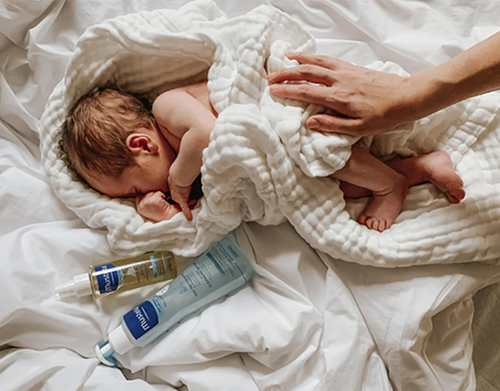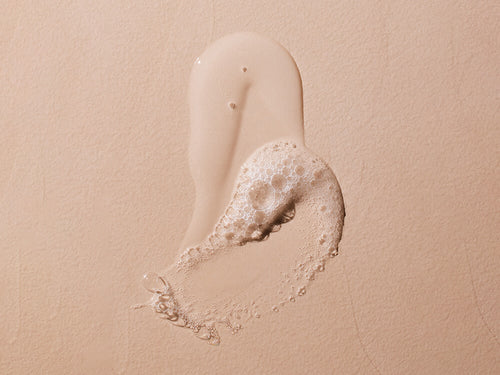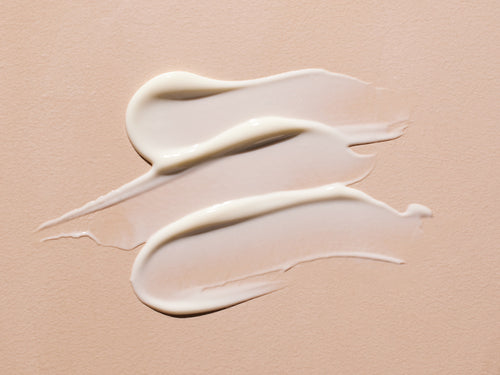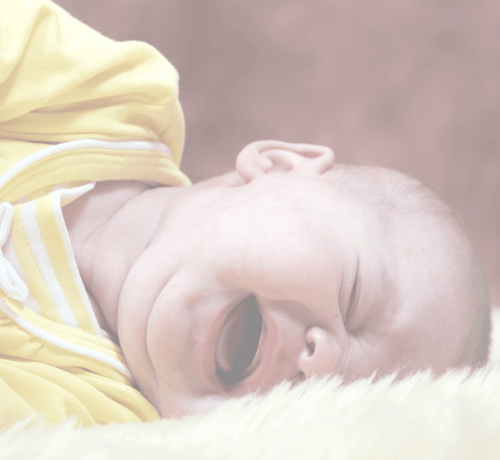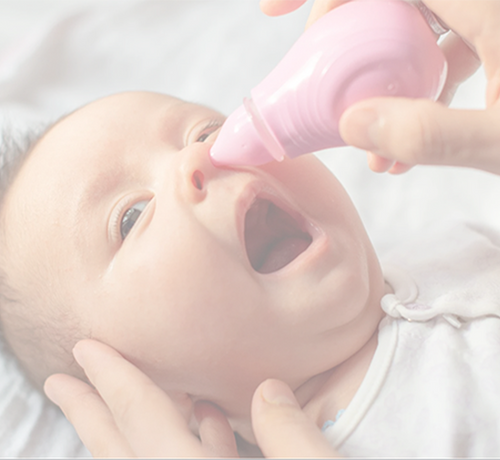It’s never too early to create a newborn bedtime routine. Putting together a schedule and doing your best to stick to it can help train your baby to sleep better and longer at night.
Now, the amount of time it takes your little one to “get in the groove” is another thing entirely!
Regardless of whether your baby takes to the routine right away or not, building habits during the first few days, weeks, and months of their life will benefit everyone down the road.
In this article, we discuss some of the basic elements of an effective newborn bedtime routine and give you tips to help you make the hours before sleep a relaxing, enjoyable time for all.
Basic Elements Of A Newborn Bedtime Routine
In this section of the article, we outline some of the most basic elements of a good newborn bedtime routine.
But that doesn’t mean that your baby won’t benefit from more — or fewer — steps in the process. The key is to find what works for you and your baby and do it night after night.
1) Bath

A great way to kick off your newborn bedtime routine is with a bath or warm wash. For the first week or two after they’re born, this will likely consist of a sponge bath or a quick cleaning with a warm baby wipe or micellar water.
Avoid “bathing” of any kind within the first 24 hours to give their skin time to develop. Then, wait until their umbilical cord falls off (typically around one or two weeks) before switching to a tub bath.
After the first few weeks, and once they’ve graduated to their tiny tub, bathe them no more than three times a week — as long as you’re thoroughly cleaning their bottom at every diaper change — so you don’t dry out their skin.
For more tips on how to bathe your newborn, check out this article from the Mustela blog: Baby's First Bath: How To Bathe Your Newborn For The First Time.
2) Diaper
Even if your newborn bedtime routine doesn’t start with a bath (which it may some nights), you should always check your baby’s diaper before continuing with the process.
This is because a dirty diaper can be very uncomfortable on their delicate skin and can actually prevent them from relaxing enough to drop into a deep sleep.
Take off and dispose of the old diaper, clean their bottom with a micellar water or baby wipe, apply a diaper rash cream or liniment, and then put on a fresh diaper for the hours ahead.
When they’re all dry and clean, they’ll be more receptive to the next few steps in your before-bed routine.
For more advice on changing your newborn’s diaper and keeping their bottom clean, check out these articles from the Mustela blog:
- 6 Different Types Of Diaper Rash: Causes And Treatment
- How Should A Diaper Fit: The Complete Guide For Parents
- The Best Way To Change A Diaper
3) Massage

Giving your baby a gentle massage is a great way to soothe and calm them down after a long day of brand-new experiences.
You’ll probably be snuggling your little one and kissing their soft skin all day long, but a massage goes even further than that. A baby massage is when you gently stroke your baby’s body with the goal of helping them relax.
Consistent massage can even help your baby gain weight, build muscle tone, calm their digestion, stimulate their immune system, and improve their mood. Who knew a gentle touch could do so much?
If you choose to give your newborn a massage before bed, apply a bit of baby oil or hydrating cream to your hand and rub your palms together to warm them up before touching your little one’s skin.
For more tips and techniques to make your massage the best it can be, take a few moments to read this article from the Mustela blog: Baby Massage 101: How To Massage Your Baby.
4) Swaddle
Once your newborn is clean, dry, and relaxed, swaddle them in a soft blanket to make them feel calm and secure.
What is swaddling? It’s a traditional practice of wrapping a newborn with their arms tucked against their body to replicate the feel of the womb.
Benefits of swaddling your newborn include:
- Warmth without using extra blankets
- Less crying
- Fewer wake-ups due to being startled
- Reduced risk of SIDS from turning on their stomach
In fact, studies have shown that swaddling can actually promote better sleep patterns in newborns when compared to other sleeping habits.
For more information on how best to swaddle your baby, read this article from the Mustela blog: How To Swaddle A Baby: Step-By-Step Guide For Parents.
5) Feed
Feeding your newborn before bed helps them feel full, content, and ready for sleep. In fact, you may find that your little one wants to eat more at night. This happens for several reasons.
One, babies burn a lot of calories during the day and they need even more calories to help their body grow during the night. Your newborn may want to cluster feed at night in order to “fuel up” before bed.
Two, feeding releases hormones in your baby’s body that promote sleep, so your little one may be self-soothing to help them relax.
Regardless of why they’re doing it, give your newborn plenty to eat before bedtime.
If you have questions about your baby’s feeding schedule, take a few minutes to read this article from the Mustela blog: Newborn Feeding Schedule: How Often To Feed Your Baby.
6) Rock
If you’ve bathed, changed, massaged, swaddled, and fed your newborn but they still haven’t fallen asleep, try slow, smooth rocking to calm them down.
In some ways, rocking mimics the movement they felt in the womb so the steady and gentle back-and-forth makes them feel secure and relaxed enough to let their guard down and drift off to dreamland.
Tips For A Successful Newborn Bedtime Routine

Be Consistent
Consistency is key when it comes to implementing a successful newborn bedtime routine.
At first, you may feel like you’re fighting an uphill battle — and you are! But, if you stick with it, your little one will eventually fall into a rhythm that works for them and you.
That said, don’t be afraid to adjust your routine if you discover that something slightly different — the addition or deletion of one or more steps in the process — might work better.
You know your baby best, so if rocking tends to wind them up instead of calm them down, take that step out of your routine.
Find The Best Time For Bedtime
Every newborn is different and no two will have the exact same bedtime (or bedtime routine). One of the best things you can do when it comes to your baby’s sleep routine is to watch and see what time works best for them.
When you get an idea of when they have a tendency to fall asleep — let’s say 8:30 p.m. — you can work backward and start your newborn bedtime routine at 8:00 p.m., 7:45 p.m., or 7:30 p.m. depending on how long it all takes.
That way, over time, your newborn will get used to taking a bath at 7:30 p.m. for their bedtime an hour later.
Be Patient
If consistency is key, patience is paramount when it comes to being successful with your newborn bedtime routine.
Your little one may not “get the message” right away and fight you (i.e., try to stay awake) when you’re trying to put them down.
Be patient with them and yourself and be as flexible as possible — especially in the first few days and weeks of their life — until you and they figure out how to make this new situation work.
Restful Nights For Happy Days With Your Baby
Creating a newborn bedtime routine that works for everyone in your family may take some time. But, that’s OK. The results are well worth the effort. You and your baby will both be able to get some much-needed rest!
To give yourself the best chance for success, use the basic elements mentioned in this article, add others that work for you and your newborn, and do your best to follow the tips for a successful night’s sleep.
And, be sure to stock up on safe, soothing baby products like baby oil, body lotion, and gentle shampoo.
Soon, you’ll all be enjoying restful nights and happy days!


